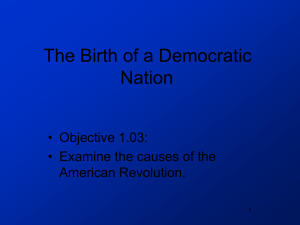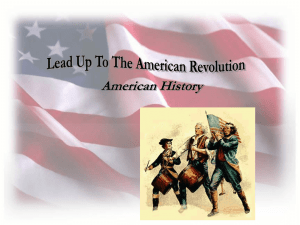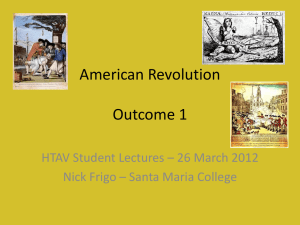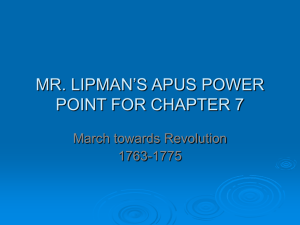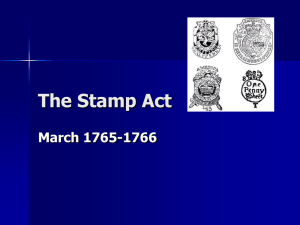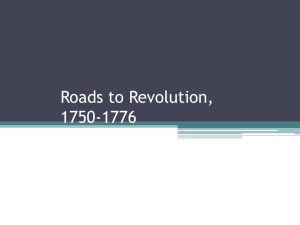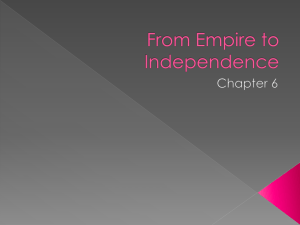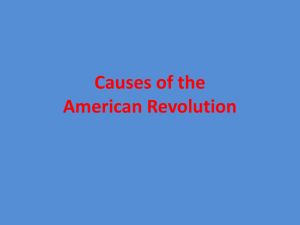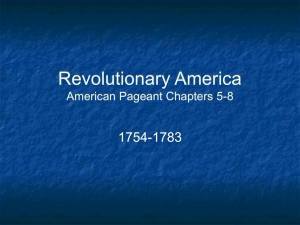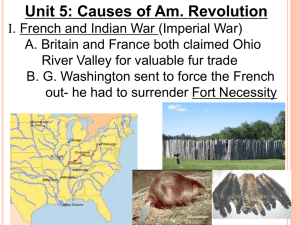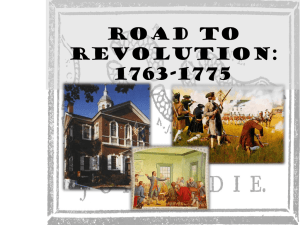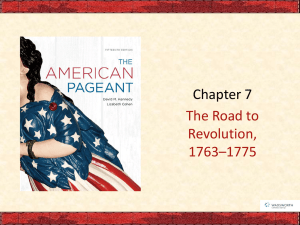The Road to Revolution A.P. U.S. History Chapter 7 1763-1775
advertisement
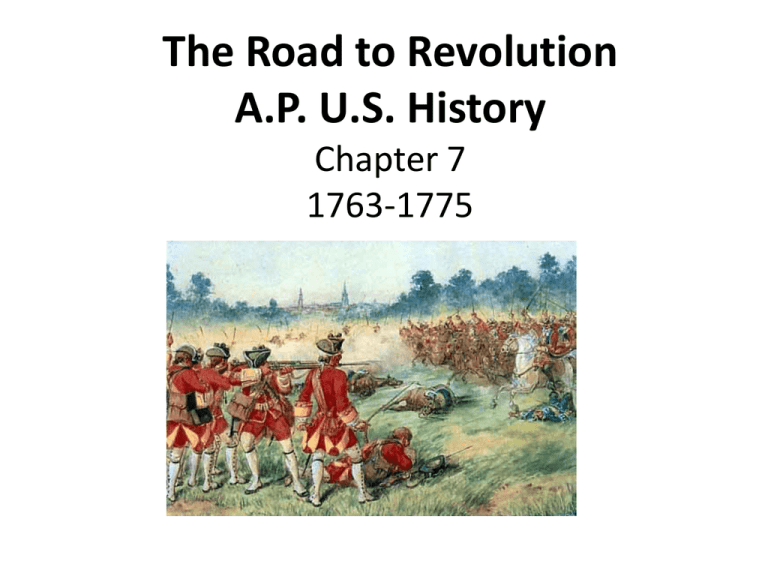
The Road to Revolution A.P. U.S. History Chapter 7 1763-1775 • Victory in the Seven Years’ War (French and Indian War) made Britain the master of a vast North American empire. • A change in their policy was to compel the American colonies to pay for some of the debt incurred protecting them. • American settlers didn’t have the age old traditions and social restraints that bound their ancestors; they got a clean slate to start a new society and way of life. • Republicanism- took root in the minds of American colonists by the mid-18th century. – Modeled on Greek and Roman republics • Said that a just society is one in which all citizens willingly subordinate their private, selfish interests to the common good and that the stability of society and the authority of government depend on the virtue of the citizenry • Radical Whigs- a group of British political commentators (widely followed in the colonies) who warned citizens to be on guard against corruption and to be eternally vigilant against possible conspiracies to take their hard won liberties. They argued against the arbitrary power o the monarch (king). • These 2 ideals or ways of thinking kept Americans on alert against any threat to their rights. • “Distance weakens authority; great distance weakens authority greatly.” • Mercantilism: the economic policy behind colonialism – Says that wealth (and military and political power) are measured by the amount of gold or silver in a country’s treasury. – Colonies exist to make money for the mother country. – The colonies provided raw materials and potential markets for finished products from the mother country. – Self-sufficiency and selfgovernment are not part of mercantilism. • The colonists also benefited from mercantilism in that they had a country full of fine finished products from which to buy from. – They also benefited from having the protection of the world’s strongest army and navy without paying for it. Navigation rules were loosely enforced • The Navigation Acts- 1650- an early attempt to enforce mercantilist policy. – Said all commerce flowing to and from the colonies could only be transported in British or colonial vessels. (getting rid of Dutch shipping competition) – European goods headed for America had to go through Britain first so that they could be taxed. – Certain “enumerated” products (like tobacco) could only be sold to Britain even though they might fetch a higher price in a foreign country. – As restrictive as they seemed, the Navigation Laws were only loosely enforced. – John Hancock made a fortune in wholesale smuggling. • Since the colonies typically bought more than they sold from the British, hard currency (gold or silver) was always in short supply, so bartering was very common. • Britain emerged from the Seven Years’ War with a debt of 140 million pounds, of which over half was from defending the American colonies. • The relationship between England and her colonies became more tense when Prime Minister George Grenville began a New Imperial Policy in 1763 (the same year that the Treaty of Paris ended the Seven Years’ War) by ordering the British navy to strictly enforce the Navigation Laws. • The Sugar Act was passed in 1764, which was the first law ever passed by Parliament for raising tax revenue in the colonies for the crown. – It was strictly enforced. • The Quartering Act of 1765 required certain colonies to provide food and quarters for British troops. • The Stamp Act 1765, raised revenues to support the new military force. – It mandated the use of stamped paper or the affixing of stamps to proved payment of the tax. – Required for about 50 items of trade including legal documents, playing cards, pamphlets, newspapers, diplomas, marriage licenses, etc. – These taxes were already familiar and far more expensive in Britain and P.M. Grenville saw it as an attempt to make the colonists pay for their own defense. – Deeply resented by the colonists. They felt these new taxes were trying to take away their liberty • Many colonies refused to quarter troops and didn’t comply with the new laws. • Violators of the Sugar Act and the Stamp Act were tried in British admiralty courts, not by juries, the burden of proof was on the defendant, not the prosecution (so no “innocent until proven guilty”) • After the French and Indian War and Pontiac’s Rebellion were over, the colonists saw no need for the presence of a standing army in the colonies, and that the real reason for their presence was to oppress them. • Many colonists argued that the new imperial policy was instituting “taxation without representation.” – Americans believed that only their colonial legislatures had any legal right to impose taxes on their people. – P.M. Grenville dismissed the Americans’ complaints and stated enjoyed virtual representation in that Parliament represented all British subjects all over the empire. – Representation in Parliament would actually have not benefited the American colonists because they would have almost always been outvoted by the more populous regions of the empire, namely England. The Stamp Act Congress • 27 delegates from 9 colonies met in N.Y. to denounce the Stamp Act in 1765. – Drew up a statement of their rights and asked the King and Parliament to repeal the Stamp Act. – It was important in that it brought together different and rival colonies for the same purpose. – A tiny step toward colonial unity. • Nonimportation agreements worked great to combat the Stamp Act. – The American colonists were united against a common problem. – Home woven handicrafts were encouraged and popular over British imports. • The Sons of Liberty and Daughters of Liberty worked hard to harass British officials, encourage support of boycotts and did an occasional tar and feathering of customs officials. • All of the stamp agents had been forced to resign out of harassment and intimidation so the Stamp Act was effectively nullified. • Boycotts and non importation agreements hit Britain’s economy hard. – America, prior to the Revolution bought 25% of all British exports. – 50% of all British shipping was devoted to the American trade. – Many Britons were angry at the fact that 2 million colonists refused to pay for only 1/3 of the cost of their own defense and 7.5 million Britons had to make up the slack with very heavy taxes. • In 1766 the Stamp Act was repealed. • The Declaratory Act was passed on the heels of the Stamp Act being repealed and stated Parliament’s right “to bind the colonies in all cases whatsoever.” • The Townshend Acts were issued in 1767 (named after “Champagne” Charley Townshend) a member of Parliament who could give brilliant speeches in Parliament even while drunk. – Issued a light duty on glass, lead, paper, paint, and tea. – An indirect customs duty payable at American ports. – Most Americans still saw it as “taxation without representation.” – The tea tax was especially irritable since 1 million Americans drank it twice a day. – The revenues from the Townshend Acts were to pay the salaries of the royal governors and judges in America. • The N.Y. legislature was suspended in 1767 for refusing the Quartering Act. • Non importation agreements sprung up against the Townshend Acts. – Smuggled tea was cheaper and abundant. • 2 regiments of troops landed in Boston in 1768 to restore order. • Many of the soldiers were drunken and profane and harassed at length by the American colonists. Where the #*! are me quarters? I just wan a pint! The Boston Massacre • March 5, 1770 – 60 people moved in on 10 redcoats pelting them with snowballs, rocks, and oyster shells. – After being clubbed and one being knocked down the soldiers opened fire wounding or killing 11 (only 5 died) – John Adams served as the defense lawyer and only 2 were convicted of manslaughter and branded on the hand. • The Townshend Acts produced 295 Pounds in a year, while the cost of the British military in the colonies for that same period was 170,000 pounds. – Financial pressure forced Parliament (and Prime Minister Lord North) to repeal the Townshend Acts. – The Tea Act, at 3 pence per pound (pretty small) was kept in place just to assert Parliament’s right to tax the colonies. • Samuel Adams, of Boston was a failure at pretty much everything but politics. • He organized the Massachusetts Committees of Correspondence. – After Boston formed theirs in 1772, 80 more sprung up in neighboring communities. • Spread ideas of resistance to British authority through interchanging letters • Virginia created a committee of correspondence in the House of Burgesses (their colonial legislature) in 1773. • Soon after every colony had a committee of correspondence. • By 1773 non importation was beginning to lag. • Colonists were beginning to buy British tea because it was cheaper than smuggled tea and cheaper than tea in England. • In 1773 the British East India Company had a 17 million pound surplus of unsold tea (because so many Americans refused to buy it) and was facing bankruptcy • Parliament awarded the company a complete monopoly of the American tea business and left the 3 pence tax in tact (which the colonists deeply resented) • None of the tea ever reached its consignees. In a multi-city attack… • Philadelphia and N.Y. demonstrators forced BEIC ships to return to London with their cargoes. • Protestors in MD burned ships and their cargoes in protest. • In Charleston, local merchants refused delivery for fear of violence. • In Boston (The Boston Tea Party) the Sons of Liberty, dressed as Indians, threw 342 chests of tea into the harbor. • Britain responded to the Boston Tea Party by passing the Coercive Acts (Intolerable Acts) to punish Boston in particular and Massachusetts in general. – The Boston Port Act closed the port of Boston until the tea was paid for. – Town meetings were forbidden. – Enforcing officials accused of crimes would be tried in England, not America. • The Quebec Act was passed in 1774, which extended the boundary of Quebec, south to the Ohio River Valley. – Protestants and those of English decent felt violated. • The First Continental Congress was summoned in 1774 to deal with the Intolerable Acts. • 12 of the 13 colonies sent representatives (all but GA) to Philadelphia – This was more of a convention than a Congress – They drafted a Declaration of Rights. – The Association was created which called for a boycott of all British goods. Nonimportation, Nonexportation, and Nonconsumption. – Parliament rejected the Congress’s petitions. – Violators of The Association were tarred and feathered. The Shot Heard Round the World • As the war for independence began, the British was the wealthiest nation and had most powerful navy in the world • They did have weaknesses of sub-par officers, long communication and supply lines, and the distraction of having to protect other colonies around the world. • April 1775, the British commander in Boston sent a detachment of troops to Lexington and Concord to seize stores of colonial gunpowder and capture colonial leaders like Samuel Adams and John Hancock. – The local militia or Minute Men refused to disperse at Lexington so the British troops fired into them, killing 8. – At Concord the British were forced to retreat – Colonists used guerilla tactics and harassed the British on their way back to Boston recording over 300 casualties including 70 killed. – After Lexington and Concord The American Revolution had begun. Lexington and Concord • The British Redcoats tried to take the arsenal (stockpile of firearms and gunpowder) at Concord, but minutemen were alerted by Paul Revere and William Dawes. • At Lexington the colonists and British met, someone fired a shot (The Shot Heard ‘Round the World) and both sides opened up. • 8 colonists were shot and killed. • The battle lasted only 15 minutes! • (Read pg 52 in “The Greatest Stories” • 2.5 million Americans faced 7.5 million Britons (about a 3:1 ratio) • Britain had a standing army with 50,000 men, while America only had poorly trained militia. • 30,000 Hessian mercenaries were hired by King George III. • 50,000 American loyalists joined the British side • America did have some outstanding civil and military leaders. • African Americans fought for both sides. • The British Parliament was divided between Tories (supporters of the King, his policies, and antiAmerican) and Whigs (opposers of the King, his policies, and champions of American liberty) • Britain’s army in America had second-rate officers, the soldiers were brutally treated, punishments harsh, provisions and food were usually scarce, old, and disgusting. – The redcoats were also 3,000 miles from home – Military orders were issued in London and were not speedy enough to change with the conditions of the war. – America had no real capital or central city to capture and cripple. – The country was huge (1,000 by 600 miles) – Ben Franklin calculated that in the time the British took to capture Boston and killed 150 American patriots, some 60,000 American babies were born. America – Had good leaders in George Washington and political leaders and diplomats like John Adams and Ben Franklin – Foreign aid eventually poured in. – Was fighting a defensive war. – A self-sustaining food supply. – Believed they were fighting a just cause. – But the colonists and the Second Continental Congress were often not united. – An almost non-existent hard coinage and worthless “continental” paper money. • Colonial Americans were actually not well armed. • Only a minority of households owned firearms and many belonged to the local militia. • Not a single gun factory existed in the colonies and an imported musket cost the equivalent of 2 months salary. • 1 in 12 militiamen reported for duty with his own gun. • Ben Franklin seriously considered arming American troops with bows and arrows. • Clothing, food, weapons, ammunition, and shoes were always in short supply. • Most militia troops were poorly trained and deserted often. • Many American suppliers and merchants made small fortunes selling to the British who paid in gold while American troops froze for lack of supplies. • Only a minority of the American population embraced the cause of independence.
